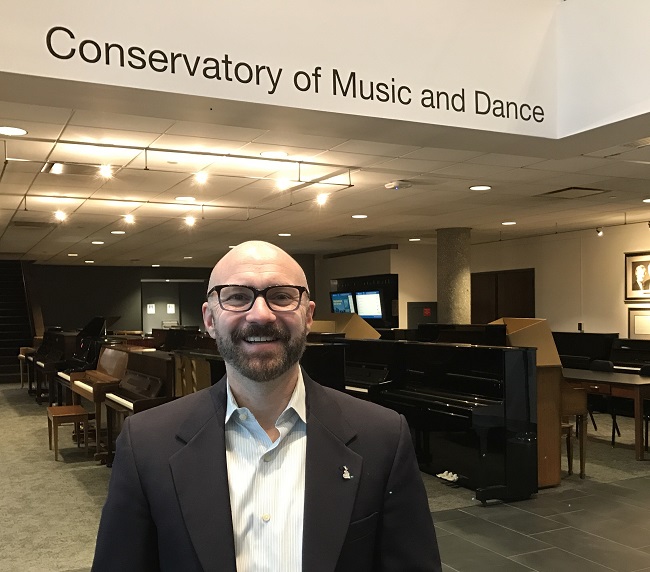By Jean Peat
When the opportunity arose for Mark Mattison to combine his love for arts, UMKC and Kansas City, he jumped at the chance to become the Conservatory’s new director of major gifts.
“With all the great things on the horizon for the Conservatory, it’s the perfect time to help make an impact on the school and the city,” Mark says.
Originally from Kansas City, Mark spent 15 years away, primarily in Washington, D.C., where he worked in public affairs and grants administration for the Corporation for Public Broadcasting. After returning home, he was director of advancement for the UMKC University Libraries, playing a major role in the Miller Nichols Library renovation and the additions of the Learning Center and the library robot, the RooBot. Before rejoining UMKC as part of the Foundation in February, Mark was executive director of Reach Out and Read Kansas City.
An alumnus of the UMKC Bloch School of Management, he holds a Master of Public Administration degree as well as a graduate certificate in secondary teaching from the American University in Washington, D.C., and a bachelor’s degree in communications from the University of Missouri.
Building student scholarships and faculty endowments are Mark’s top priorities as he starts his new role.
“The Conservatory’s ability to offer scholarships and endowed faculty positions provides the greatest opportunities for attracting and retaining the very best students and faculty,” Mark says. “That is, of course, in addition to providing the highest quality instruction and rehearsal and performance facilities.”
One way UMKC plans to preserve and enhance the Conservatory as a valuable asset to the university and region is by building a new Downtown Campus for the Arts. Through donor contributions and state funding, the $96 million project would have a major impact on the area’s arts economy while providing state-of-the-art facilities for future students.
“The Downtown Arts Campus will amplify the Conservatory’s already strong, well-established name and solidify our reputation alongside institutions like Julliard,” Mark says. “It will give students much needed space to learn and rehearse while drawing inspiration from nearby Kauffman Center, Folly and Crossroads Arts District.”
For Mark, the biggest benefit of his new job is the chance to work closely with other members of the community who share his passion for the arts and how it contributes to the city’s quality of life.
“Private donors who support the Conservatory know that public arts funding is seriously lacking and, because the arts are important to them and our community, they want to do what they can to help fill the gap,” Marks says. “I also think people enjoy financially supporting music and dance because it is very concrete – they can share a performance with their family and even get to know the students and faculty scholars they support. They’re able to enjoy the results almost immediately, as well as see the long-term fruits of their investment.”

